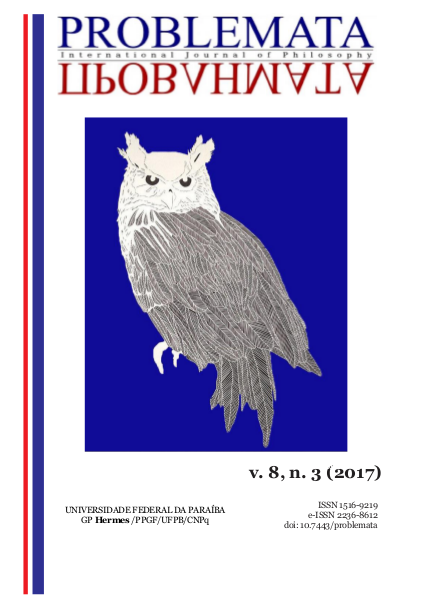REPRESENTAÇÕES NO EMPIRISMO CONCEITUAL DE PRINZ
DOI:
https://doi.org/10.7443/problemata.v8i3.33309Keywords:
Representações perceptuais, Conceitos, IntencionalidadeAbstract
A proxytype theory de Jesse Prinz vincula, mas não identifica, representações e conceitos. Ofereço uma apresentação geral dessa teoria, tratando de realçar que conceitos são entendidos como cópias de representações perceptuais. Em seguida, apresento e critico a concepção de intencionaldade que Prinz subscreve. Com efeito, penso que essa teoria da intencionalidade é imprecisa no que tange à determinação da referência.Downloads
References
DRETSKE, F. Knowledge and the flow of information. Cambridge: MIT Press, 1981.
FODOR, J. The modularity of mind. Cambridge: MIT Press, 1983.
KANT, I. Crítica da razão pura. 5.ed. Tradução de Manuela dos Santos e Alexandre Morujão. Lisboa: Fundação Calouste Gulbenkian, 2001.
MACHERY, E. Doing without concepts. Oxford: Oxford University Press, 2009.
LOCKE, J. An essay concerning human understanding. 27.ed. London: Thomas Tegg and Son, 1836.
ROSA, R. Prinz’s problematic proxytypes. The Philosophical Quartely, v. 55, n. 221, p. 594-606, 2005.
MARGOLIS E.; LAURENCE, S. Concepts. In: ZALTA, E. (Ed.) The Stanford Encyclopedia of Philosophy, 2012. Acessível em:
PRINZ, J. Furnishing the mind: concepts and their perceptual basis. Cambridge: MIT Press, 2002.
PRINZ, J. The return of concept empiricism. In: COHEN, H.; LEFEBVRE, C. (Eds.) Handbook of categorization in cognitive science. Amsterdam: Elsevier Science, 2005. p. 679-695.
Downloads
Published
Issue
Section
License
Authors who publish with this journal agree to the following terms:
- Authors retain copyright and grant the journal right of first publication with the work simultaneously licensed under a Creative Commons Attribution License that allows others to share the work with an acknowledgement of the work's authorship and initial publication in this journal.
- Authors are able to enter into separate, additional contractual arrangements for the non-exclusive distribution of the journal's published version of the work (e.g., post it to an institutional repository or publish it in a book), with an acknowledgement of its initial publication in this journal.
-
- Authors are permitted and encouraged to post their work online (e.g., in institutional repositories or on their website) prior to and during the submission process, as it can lead to productive exchanges, as well as earlier and greater citation of published work (See The Effect of Open Access).





